Vegetable Food Safety Handling: Attitudes and Perceptions - La Trobe
VerifiedAdded on 2023/06/18
|10
|3471
|398
Report
AI Summary
This report presents a survey-based study on the attitudes and perceptions of individuals regarding the safe handling of vegetables, emphasizing the importance of food safety in preventing foodborne illnesses. The methodology includes a mixed-method research approach, incorporating both qualitative and quantitative data collection techniques such as online surveys. The research philosophy covers epistemology, positivism, realism, interpretivism, ontology, objectivism, constructivism, pragmatism, and axiology to provide a comprehensive understanding of the topic. The findings highlight the need for increased awareness and improved practices in food handling to mitigate health risks. The study also considers ethical considerations to ensure privacy and confidentiality. Desklib offers a range of study tools and resources, including solved assignments and past papers, to support students in their academic endeavors.
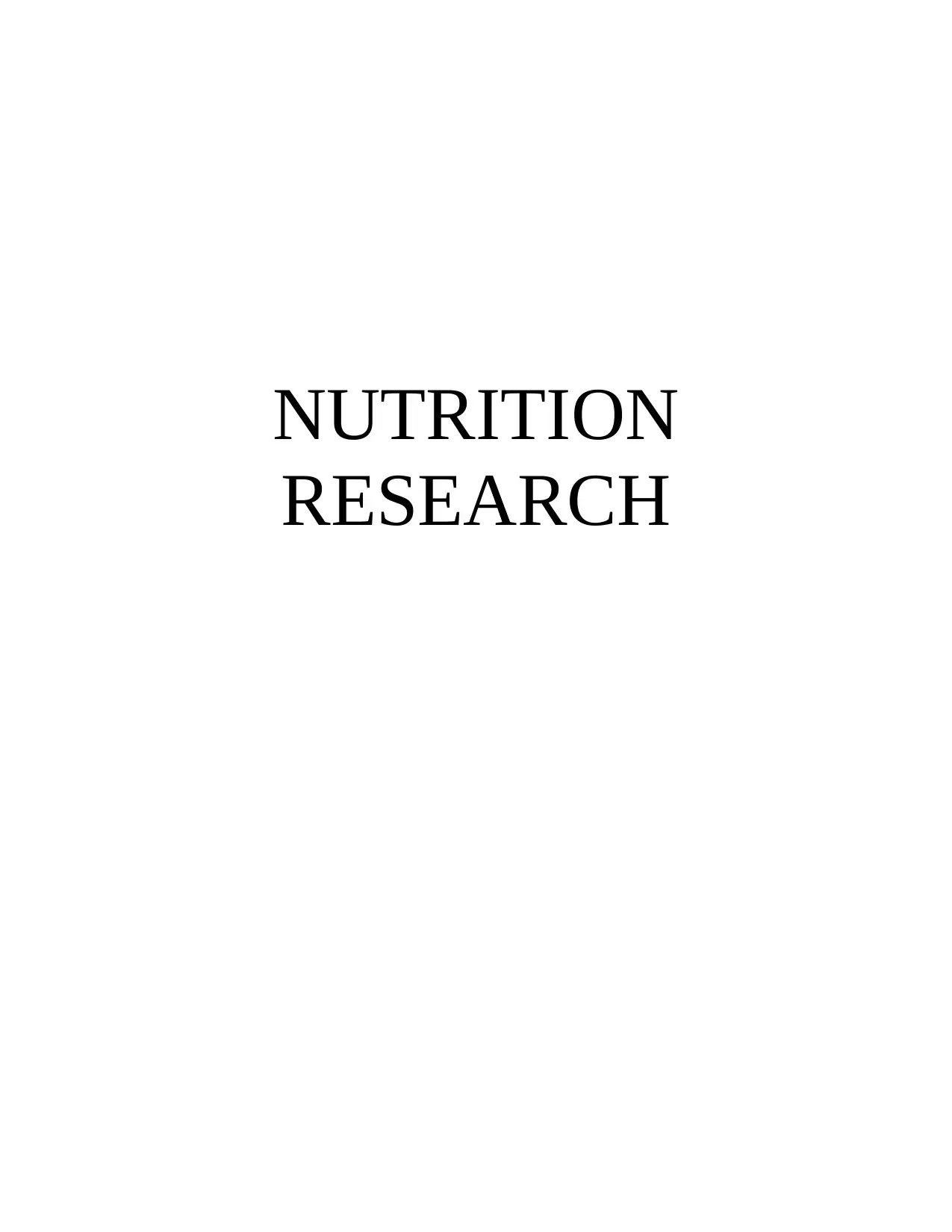
NUTRITION
RESEARCH
RESEARCH
Paraphrase This Document
Need a fresh take? Get an instant paraphrase of this document with our AI Paraphraser
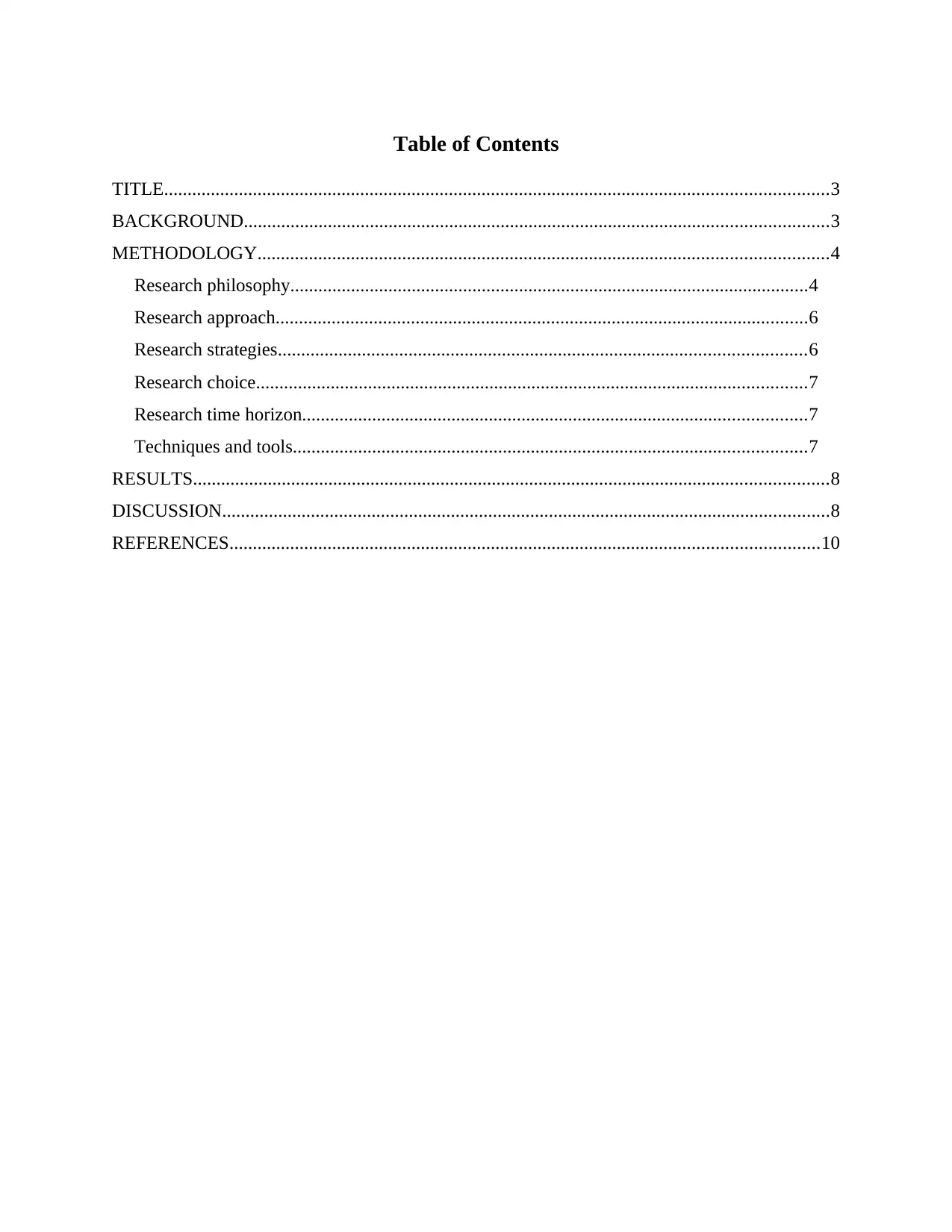
Table of Contents
TITLE..............................................................................................................................................3
BACKGROUND.............................................................................................................................3
METHODOLOGY..........................................................................................................................4
Research philosophy...............................................................................................................4
Research approach..................................................................................................................6
Research strategies.................................................................................................................6
Research choice......................................................................................................................7
Research time horizon............................................................................................................7
Techniques and tools..............................................................................................................7
RESULTS........................................................................................................................................8
DISCUSSION..................................................................................................................................8
REFERENCES..............................................................................................................................10
TITLE..............................................................................................................................................3
BACKGROUND.............................................................................................................................3
METHODOLOGY..........................................................................................................................4
Research philosophy...............................................................................................................4
Research approach..................................................................................................................6
Research strategies.................................................................................................................6
Research choice......................................................................................................................7
Research time horizon............................................................................................................7
Techniques and tools..............................................................................................................7
RESULTS........................................................................................................................................8
DISCUSSION..................................................................................................................................8
REFERENCES..............................................................................................................................10
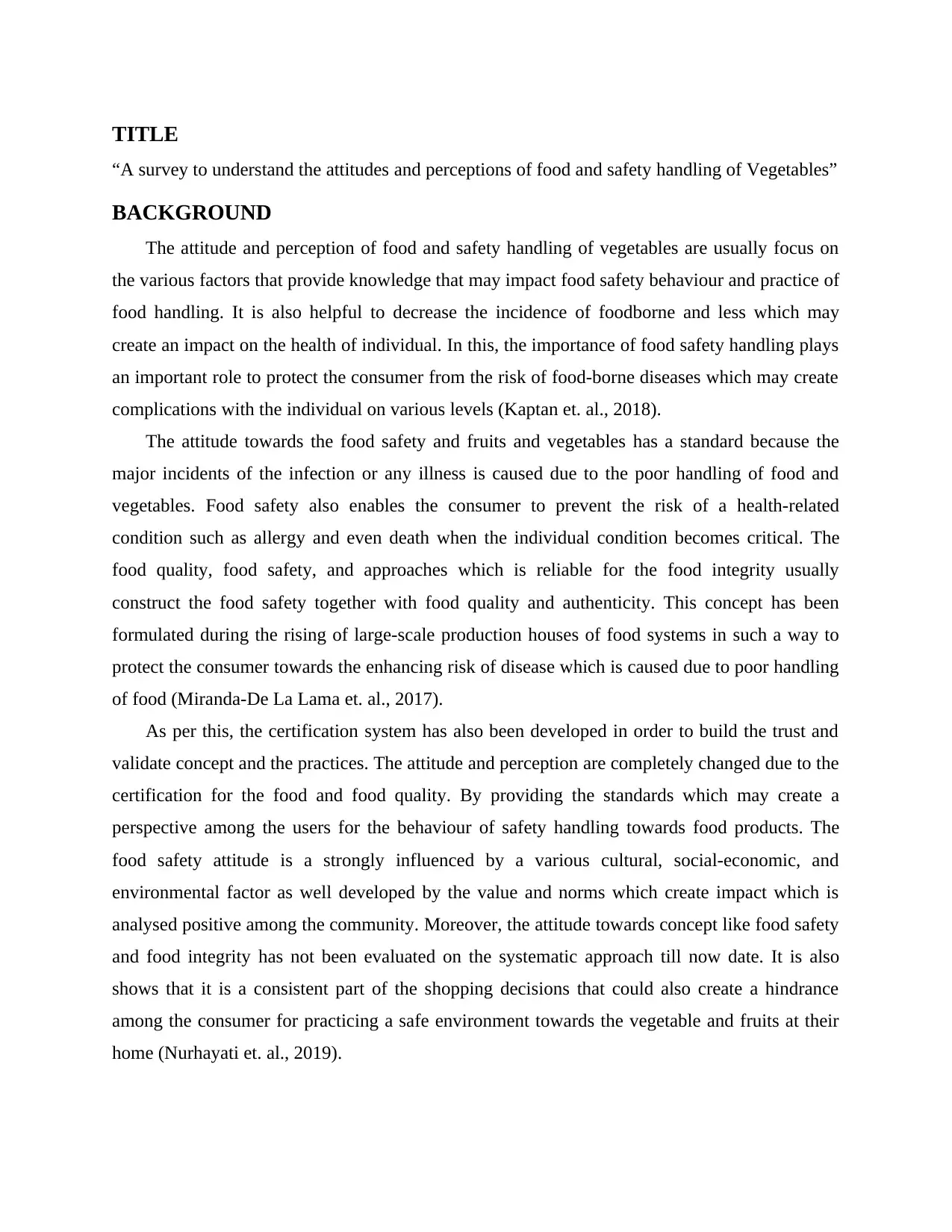
TITLE
“A survey to understand the attitudes and perceptions of food and safety handling of Vegetables”
BACKGROUND
The attitude and perception of food and safety handling of vegetables are usually focus on
the various factors that provide knowledge that may impact food safety behaviour and practice of
food handling. It is also helpful to decrease the incidence of foodborne and less which may
create an impact on the health of individual. In this, the importance of food safety handling plays
an important role to protect the consumer from the risk of food-borne diseases which may create
complications with the individual on various levels (Kaptan et. al., 2018).
The attitude towards the food safety and fruits and vegetables has a standard because the
major incidents of the infection or any illness is caused due to the poor handling of food and
vegetables. Food safety also enables the consumer to prevent the risk of a health-related
condition such as allergy and even death when the individual condition becomes critical. The
food quality, food safety, and approaches which is reliable for the food integrity usually
construct the food safety together with food quality and authenticity. This concept has been
formulated during the rising of large-scale production houses of food systems in such a way to
protect the consumer towards the enhancing risk of disease which is caused due to poor handling
of food (Miranda-De La Lama et. al., 2017).
As per this, the certification system has also been developed in order to build the trust and
validate concept and the practices. The attitude and perception are completely changed due to the
certification for the food and food quality. By providing the standards which may create a
perspective among the users for the behaviour of safety handling towards food products. The
food safety attitude is a strongly influenced by a various cultural, social-economic, and
environmental factor as well developed by the value and norms which create impact which is
analysed positive among the community. Moreover, the attitude towards concept like food safety
and food integrity has not been evaluated on the systematic approach till now date. It is also
shows that it is a consistent part of the shopping decisions that could also create a hindrance
among the consumer for practicing a safe environment towards the vegetable and fruits at their
home (Nurhayati et. al., 2019).
“A survey to understand the attitudes and perceptions of food and safety handling of Vegetables”
BACKGROUND
The attitude and perception of food and safety handling of vegetables are usually focus on
the various factors that provide knowledge that may impact food safety behaviour and practice of
food handling. It is also helpful to decrease the incidence of foodborne and less which may
create an impact on the health of individual. In this, the importance of food safety handling plays
an important role to protect the consumer from the risk of food-borne diseases which may create
complications with the individual on various levels (Kaptan et. al., 2018).
The attitude towards the food safety and fruits and vegetables has a standard because the
major incidents of the infection or any illness is caused due to the poor handling of food and
vegetables. Food safety also enables the consumer to prevent the risk of a health-related
condition such as allergy and even death when the individual condition becomes critical. The
food quality, food safety, and approaches which is reliable for the food integrity usually
construct the food safety together with food quality and authenticity. This concept has been
formulated during the rising of large-scale production houses of food systems in such a way to
protect the consumer towards the enhancing risk of disease which is caused due to poor handling
of food (Miranda-De La Lama et. al., 2017).
As per this, the certification system has also been developed in order to build the trust and
validate concept and the practices. The attitude and perception are completely changed due to the
certification for the food and food quality. By providing the standards which may create a
perspective among the users for the behaviour of safety handling towards food products. The
food safety attitude is a strongly influenced by a various cultural, social-economic, and
environmental factor as well developed by the value and norms which create impact which is
analysed positive among the community. Moreover, the attitude towards concept like food safety
and food integrity has not been evaluated on the systematic approach till now date. It is also
shows that it is a consistent part of the shopping decisions that could also create a hindrance
among the consumer for practicing a safe environment towards the vegetable and fruits at their
home (Nurhayati et. al., 2019).
⊘ This is a preview!⊘
Do you want full access?
Subscribe today to unlock all pages.

Trusted by 1+ million students worldwide
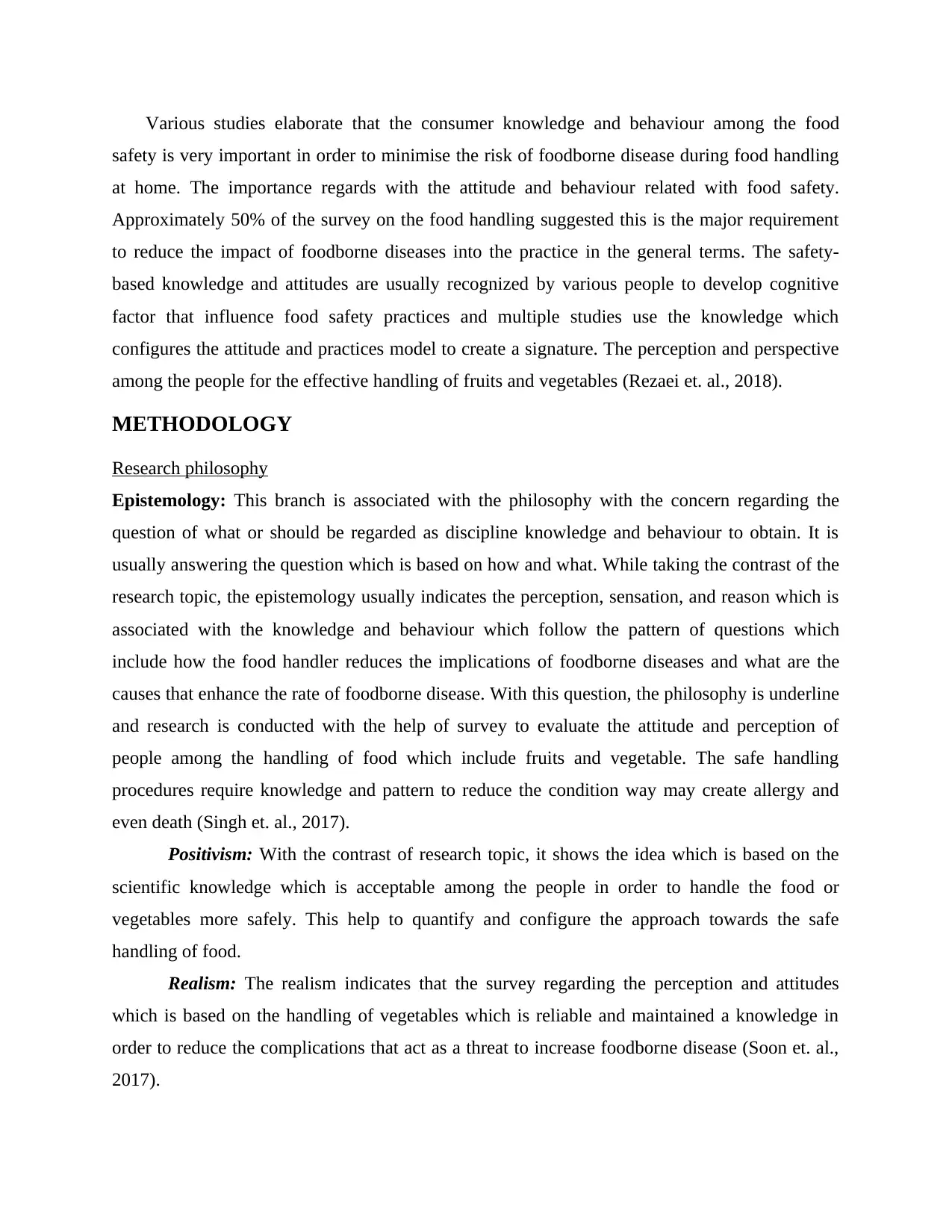
Various studies elaborate that the consumer knowledge and behaviour among the food
safety is very important in order to minimise the risk of foodborne disease during food handling
at home. The importance regards with the attitude and behaviour related with food safety.
Approximately 50% of the survey on the food handling suggested this is the major requirement
to reduce the impact of foodborne diseases into the practice in the general terms. The safety-
based knowledge and attitudes are usually recognized by various people to develop cognitive
factor that influence food safety practices and multiple studies use the knowledge which
configures the attitude and practices model to create a signature. The perception and perspective
among the people for the effective handling of fruits and vegetables (Rezaei et. al., 2018).
METHODOLOGY
Research philosophy
Epistemology: This branch is associated with the philosophy with the concern regarding the
question of what or should be regarded as discipline knowledge and behaviour to obtain. It is
usually answering the question which is based on how and what. While taking the contrast of the
research topic, the epistemology usually indicates the perception, sensation, and reason which is
associated with the knowledge and behaviour which follow the pattern of questions which
include how the food handler reduces the implications of foodborne diseases and what are the
causes that enhance the rate of foodborne disease. With this question, the philosophy is underline
and research is conducted with the help of survey to evaluate the attitude and perception of
people among the handling of food which include fruits and vegetable. The safe handling
procedures require knowledge and pattern to reduce the condition way may create allergy and
even death (Singh et. al., 2017).
Positivism: With the contrast of research topic, it shows the idea which is based on the
scientific knowledge which is acceptable among the people in order to handle the food or
vegetables more safely. This help to quantify and configure the approach towards the safe
handling of food.
Realism: The realism indicates that the survey regarding the perception and attitudes
which is based on the handling of vegetables which is reliable and maintained a knowledge in
order to reduce the complications that act as a threat to increase foodborne disease (Soon et. al.,
2017).
safety is very important in order to minimise the risk of foodborne disease during food handling
at home. The importance regards with the attitude and behaviour related with food safety.
Approximately 50% of the survey on the food handling suggested this is the major requirement
to reduce the impact of foodborne diseases into the practice in the general terms. The safety-
based knowledge and attitudes are usually recognized by various people to develop cognitive
factor that influence food safety practices and multiple studies use the knowledge which
configures the attitude and practices model to create a signature. The perception and perspective
among the people for the effective handling of fruits and vegetables (Rezaei et. al., 2018).
METHODOLOGY
Research philosophy
Epistemology: This branch is associated with the philosophy with the concern regarding the
question of what or should be regarded as discipline knowledge and behaviour to obtain. It is
usually answering the question which is based on how and what. While taking the contrast of the
research topic, the epistemology usually indicates the perception, sensation, and reason which is
associated with the knowledge and behaviour which follow the pattern of questions which
include how the food handler reduces the implications of foodborne diseases and what are the
causes that enhance the rate of foodborne disease. With this question, the philosophy is underline
and research is conducted with the help of survey to evaluate the attitude and perception of
people among the handling of food which include fruits and vegetable. The safe handling
procedures require knowledge and pattern to reduce the condition way may create allergy and
even death (Singh et. al., 2017).
Positivism: With the contrast of research topic, it shows the idea which is based on the
scientific knowledge which is acceptable among the people in order to handle the food or
vegetables more safely. This help to quantify and configure the approach towards the safe
handling of food.
Realism: The realism indicates that the survey regarding the perception and attitudes
which is based on the handling of vegetables which is reliable and maintained a knowledge in
order to reduce the complications that act as a threat to increase foodborne disease (Soon et. al.,
2017).
Paraphrase This Document
Need a fresh take? Get an instant paraphrase of this document with our AI Paraphraser
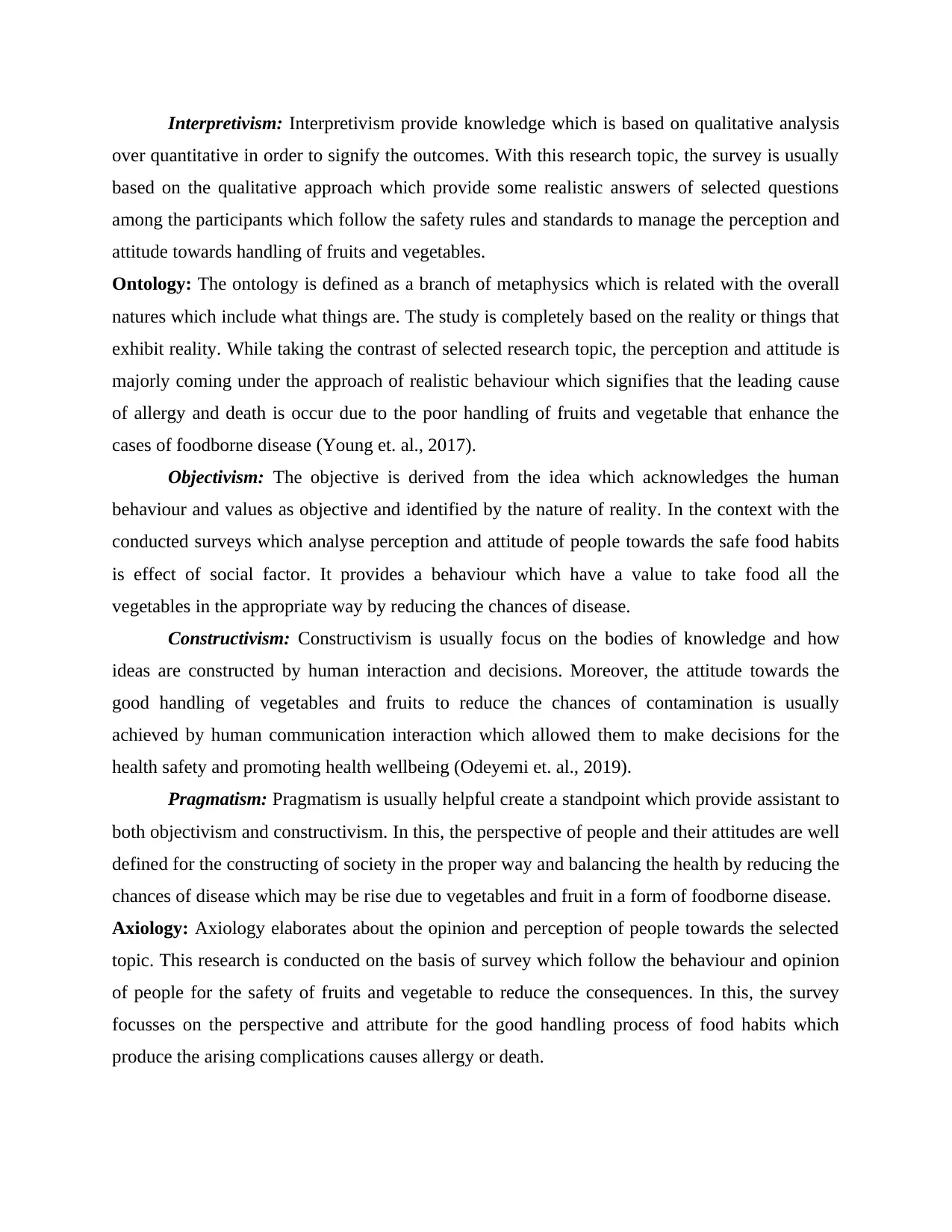
Interpretivism: Interpretivism provide knowledge which is based on qualitative analysis
over quantitative in order to signify the outcomes. With this research topic, the survey is usually
based on the qualitative approach which provide some realistic answers of selected questions
among the participants which follow the safety rules and standards to manage the perception and
attitude towards handling of fruits and vegetables.
Ontology: The ontology is defined as a branch of metaphysics which is related with the overall
natures which include what things are. The study is completely based on the reality or things that
exhibit reality. While taking the contrast of selected research topic, the perception and attitude is
majorly coming under the approach of realistic behaviour which signifies that the leading cause
of allergy and death is occur due to the poor handling of fruits and vegetable that enhance the
cases of foodborne disease (Young et. al., 2017).
Objectivism: The objective is derived from the idea which acknowledges the human
behaviour and values as objective and identified by the nature of reality. In the context with the
conducted surveys which analyse perception and attitude of people towards the safe food habits
is effect of social factor. It provides a behaviour which have a value to take food all the
vegetables in the appropriate way by reducing the chances of disease.
Constructivism: Constructivism is usually focus on the bodies of knowledge and how
ideas are constructed by human interaction and decisions. Moreover, the attitude towards the
good handling of vegetables and fruits to reduce the chances of contamination is usually
achieved by human communication interaction which allowed them to make decisions for the
health safety and promoting health wellbeing (Odeyemi et. al., 2019).
Pragmatism: Pragmatism is usually helpful create a standpoint which provide assistant to
both objectivism and constructivism. In this, the perspective of people and their attitudes are well
defined for the constructing of society in the proper way and balancing the health by reducing the
chances of disease which may be rise due to vegetables and fruit in a form of foodborne disease.
Axiology: Axiology elaborates about the opinion and perception of people towards the selected
topic. This research is conducted on the basis of survey which follow the behaviour and opinion
of people for the safety of fruits and vegetable to reduce the consequences. In this, the survey
focusses on the perspective and attribute for the good handling process of food habits which
produce the arising complications causes allergy or death.
over quantitative in order to signify the outcomes. With this research topic, the survey is usually
based on the qualitative approach which provide some realistic answers of selected questions
among the participants which follow the safety rules and standards to manage the perception and
attitude towards handling of fruits and vegetables.
Ontology: The ontology is defined as a branch of metaphysics which is related with the overall
natures which include what things are. The study is completely based on the reality or things that
exhibit reality. While taking the contrast of selected research topic, the perception and attitude is
majorly coming under the approach of realistic behaviour which signifies that the leading cause
of allergy and death is occur due to the poor handling of fruits and vegetable that enhance the
cases of foodborne disease (Young et. al., 2017).
Objectivism: The objective is derived from the idea which acknowledges the human
behaviour and values as objective and identified by the nature of reality. In the context with the
conducted surveys which analyse perception and attitude of people towards the safe food habits
is effect of social factor. It provides a behaviour which have a value to take food all the
vegetables in the appropriate way by reducing the chances of disease.
Constructivism: Constructivism is usually focus on the bodies of knowledge and how
ideas are constructed by human interaction and decisions. Moreover, the attitude towards the
good handling of vegetables and fruits to reduce the chances of contamination is usually
achieved by human communication interaction which allowed them to make decisions for the
health safety and promoting health wellbeing (Odeyemi et. al., 2019).
Pragmatism: Pragmatism is usually helpful create a standpoint which provide assistant to
both objectivism and constructivism. In this, the perspective of people and their attitudes are well
defined for the constructing of society in the proper way and balancing the health by reducing the
chances of disease which may be rise due to vegetables and fruit in a form of foodborne disease.
Axiology: Axiology elaborates about the opinion and perception of people towards the selected
topic. This research is conducted on the basis of survey which follow the behaviour and opinion
of people for the safety of fruits and vegetable to reduce the consequences. In this, the survey
focusses on the perspective and attribute for the good handling process of food habits which
produce the arising complications causes allergy or death.
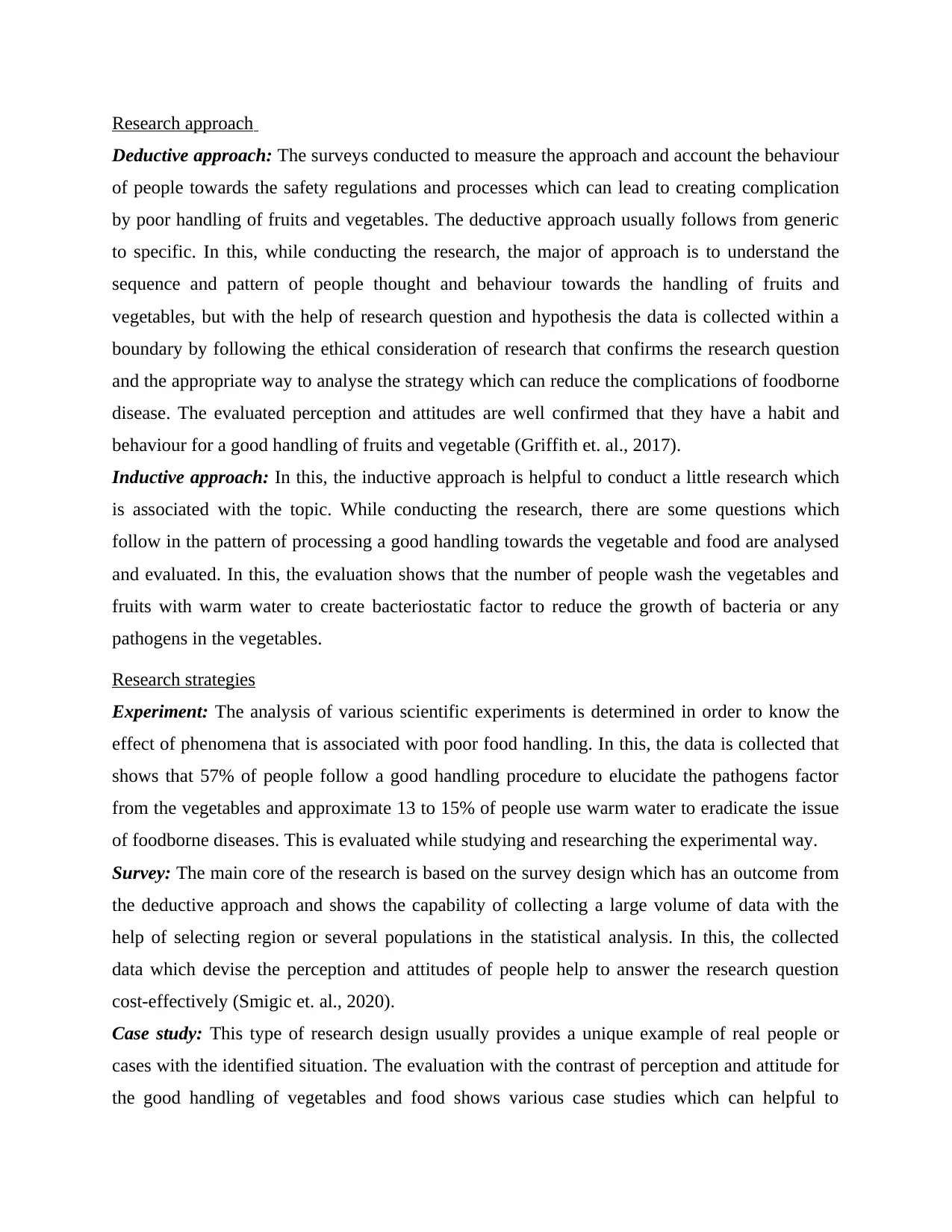
Research approach
Deductive approach: The surveys conducted to measure the approach and account the behaviour
of people towards the safety regulations and processes which can lead to creating complication
by poor handling of fruits and vegetables. The deductive approach usually follows from generic
to specific. In this, while conducting the research, the major of approach is to understand the
sequence and pattern of people thought and behaviour towards the handling of fruits and
vegetables, but with the help of research question and hypothesis the data is collected within a
boundary by following the ethical consideration of research that confirms the research question
and the appropriate way to analyse the strategy which can reduce the complications of foodborne
disease. The evaluated perception and attitudes are well confirmed that they have a habit and
behaviour for a good handling of fruits and vegetable (Griffith et. al., 2017).
Inductive approach: In this, the inductive approach is helpful to conduct a little research which
is associated with the topic. While conducting the research, there are some questions which
follow in the pattern of processing a good handling towards the vegetable and food are analysed
and evaluated. In this, the evaluation shows that the number of people wash the vegetables and
fruits with warm water to create bacteriostatic factor to reduce the growth of bacteria or any
pathogens in the vegetables.
Research strategies
Experiment: The analysis of various scientific experiments is determined in order to know the
effect of phenomena that is associated with poor food handling. In this, the data is collected that
shows that 57% of people follow a good handling procedure to elucidate the pathogens factor
from the vegetables and approximate 13 to 15% of people use warm water to eradicate the issue
of foodborne diseases. This is evaluated while studying and researching the experimental way.
Survey: The main core of the research is based on the survey design which has an outcome from
the deductive approach and shows the capability of collecting a large volume of data with the
help of selecting region or several populations in the statistical analysis. In this, the collected
data which devise the perception and attitudes of people help to answer the research question
cost-effectively (Smigic et. al., 2020).
Case study: This type of research design usually provides a unique example of real people or
cases with the identified situation. The evaluation with the contrast of perception and attitude for
the good handling of vegetables and food shows various case studies which can helpful to
Deductive approach: The surveys conducted to measure the approach and account the behaviour
of people towards the safety regulations and processes which can lead to creating complication
by poor handling of fruits and vegetables. The deductive approach usually follows from generic
to specific. In this, while conducting the research, the major of approach is to understand the
sequence and pattern of people thought and behaviour towards the handling of fruits and
vegetables, but with the help of research question and hypothesis the data is collected within a
boundary by following the ethical consideration of research that confirms the research question
and the appropriate way to analyse the strategy which can reduce the complications of foodborne
disease. The evaluated perception and attitudes are well confirmed that they have a habit and
behaviour for a good handling of fruits and vegetable (Griffith et. al., 2017).
Inductive approach: In this, the inductive approach is helpful to conduct a little research which
is associated with the topic. While conducting the research, there are some questions which
follow in the pattern of processing a good handling towards the vegetable and food are analysed
and evaluated. In this, the evaluation shows that the number of people wash the vegetables and
fruits with warm water to create bacteriostatic factor to reduce the growth of bacteria or any
pathogens in the vegetables.
Research strategies
Experiment: The analysis of various scientific experiments is determined in order to know the
effect of phenomena that is associated with poor food handling. In this, the data is collected that
shows that 57% of people follow a good handling procedure to elucidate the pathogens factor
from the vegetables and approximate 13 to 15% of people use warm water to eradicate the issue
of foodborne diseases. This is evaluated while studying and researching the experimental way.
Survey: The main core of the research is based on the survey design which has an outcome from
the deductive approach and shows the capability of collecting a large volume of data with the
help of selecting region or several populations in the statistical analysis. In this, the collected
data which devise the perception and attitudes of people help to answer the research question
cost-effectively (Smigic et. al., 2020).
Case study: This type of research design usually provides a unique example of real people or
cases with the identified situation. The evaluation with the contrast of perception and attitude for
the good handling of vegetables and food shows various case studies which can helpful to
⊘ This is a preview!⊘
Do you want full access?
Subscribe today to unlock all pages.

Trusted by 1+ million students worldwide
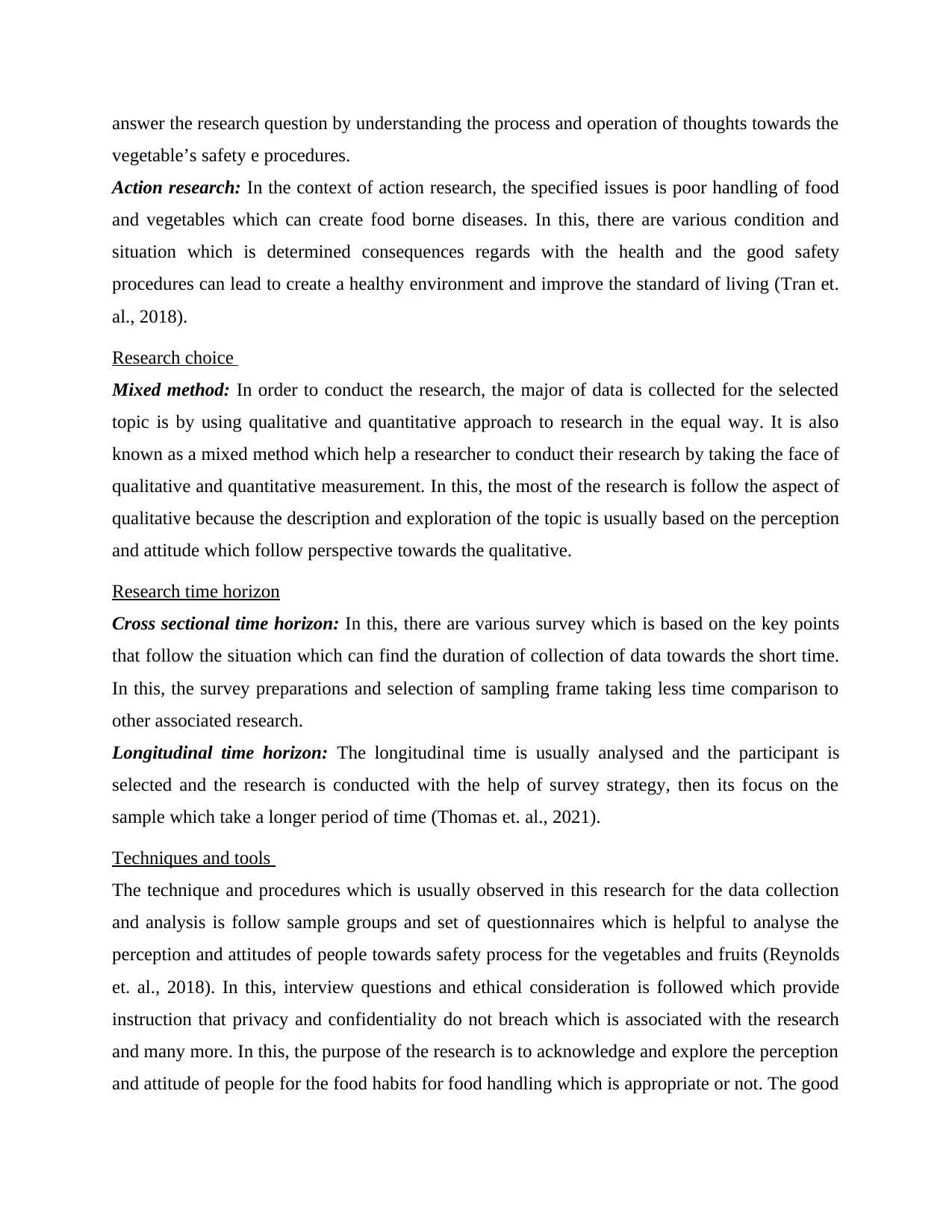
answer the research question by understanding the process and operation of thoughts towards the
vegetable’s safety e procedures.
Action research: In the context of action research, the specified issues is poor handling of food
and vegetables which can create food borne diseases. In this, there are various condition and
situation which is determined consequences regards with the health and the good safety
procedures can lead to create a healthy environment and improve the standard of living (Tran et.
al., 2018).
Research choice
Mixed method: In order to conduct the research, the major of data is collected for the selected
topic is by using qualitative and quantitative approach to research in the equal way. It is also
known as a mixed method which help a researcher to conduct their research by taking the face of
qualitative and quantitative measurement. In this, the most of the research is follow the aspect of
qualitative because the description and exploration of the topic is usually based on the perception
and attitude which follow perspective towards the qualitative.
Research time horizon
Cross sectional time horizon: In this, there are various survey which is based on the key points
that follow the situation which can find the duration of collection of data towards the short time.
In this, the survey preparations and selection of sampling frame taking less time comparison to
other associated research.
Longitudinal time horizon: The longitudinal time is usually analysed and the participant is
selected and the research is conducted with the help of survey strategy, then its focus on the
sample which take a longer period of time (Thomas et. al., 2021).
Techniques and tools
The technique and procedures which is usually observed in this research for the data collection
and analysis is follow sample groups and set of questionnaires which is helpful to analyse the
perception and attitudes of people towards safety process for the vegetables and fruits (Reynolds
et. al., 2018). In this, interview questions and ethical consideration is followed which provide
instruction that privacy and confidentiality do not breach which is associated with the research
and many more. In this, the purpose of the research is to acknowledge and explore the perception
and attitude of people for the food habits for food handling which is appropriate or not. The good
vegetable’s safety e procedures.
Action research: In the context of action research, the specified issues is poor handling of food
and vegetables which can create food borne diseases. In this, there are various condition and
situation which is determined consequences regards with the health and the good safety
procedures can lead to create a healthy environment and improve the standard of living (Tran et.
al., 2018).
Research choice
Mixed method: In order to conduct the research, the major of data is collected for the selected
topic is by using qualitative and quantitative approach to research in the equal way. It is also
known as a mixed method which help a researcher to conduct their research by taking the face of
qualitative and quantitative measurement. In this, the most of the research is follow the aspect of
qualitative because the description and exploration of the topic is usually based on the perception
and attitude which follow perspective towards the qualitative.
Research time horizon
Cross sectional time horizon: In this, there are various survey which is based on the key points
that follow the situation which can find the duration of collection of data towards the short time.
In this, the survey preparations and selection of sampling frame taking less time comparison to
other associated research.
Longitudinal time horizon: The longitudinal time is usually analysed and the participant is
selected and the research is conducted with the help of survey strategy, then its focus on the
sample which take a longer period of time (Thomas et. al., 2021).
Techniques and tools
The technique and procedures which is usually observed in this research for the data collection
and analysis is follow sample groups and set of questionnaires which is helpful to analyse the
perception and attitudes of people towards safety process for the vegetables and fruits (Reynolds
et. al., 2018). In this, interview questions and ethical consideration is followed which provide
instruction that privacy and confidentiality do not breach which is associated with the research
and many more. In this, the purpose of the research is to acknowledge and explore the perception
and attitude of people for the food habits for food handling which is appropriate or not. The good
Paraphrase This Document
Need a fresh take? Get an instant paraphrase of this document with our AI Paraphraser
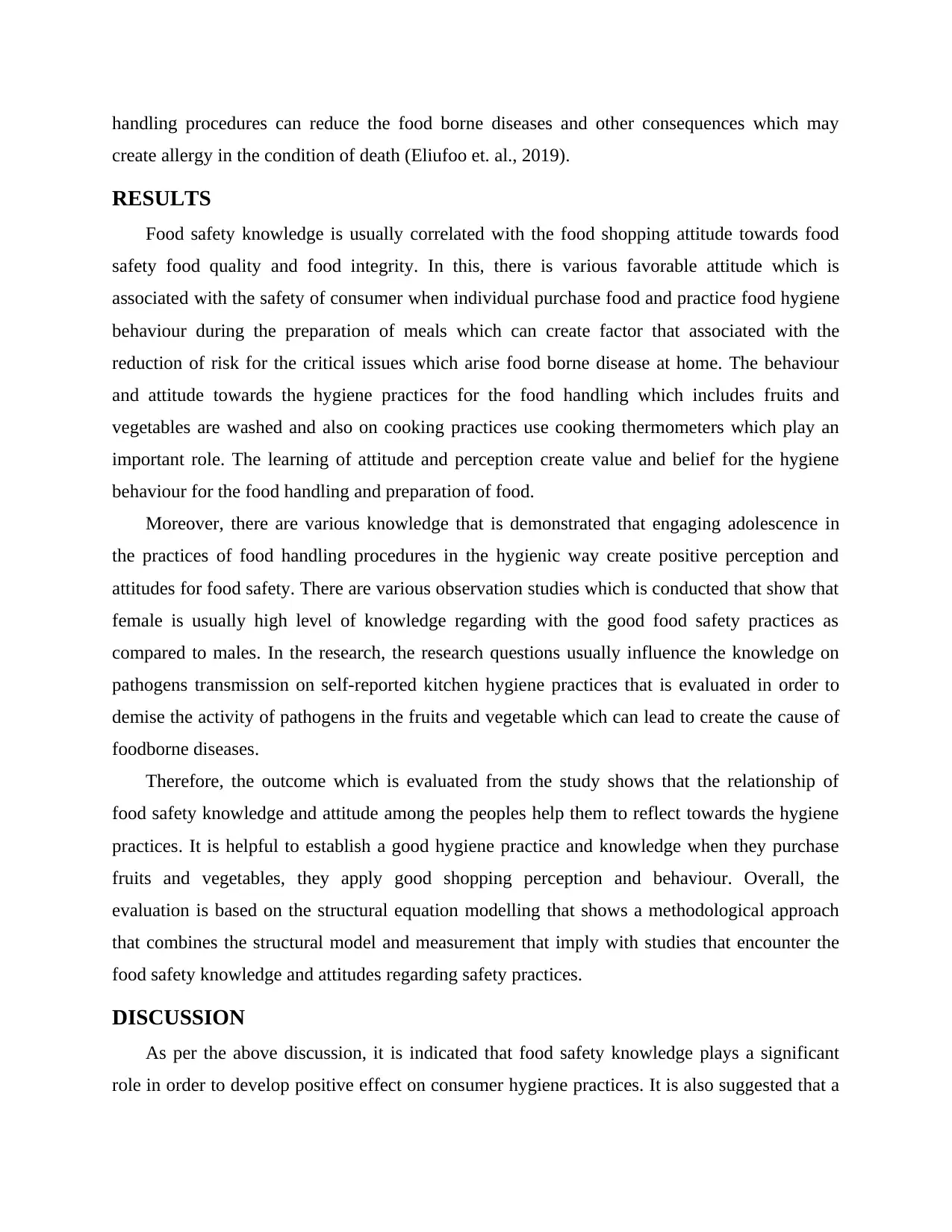
handling procedures can reduce the food borne diseases and other consequences which may
create allergy in the condition of death (Eliufoo et. al., 2019).
RESULTS
Food safety knowledge is usually correlated with the food shopping attitude towards food
safety food quality and food integrity. In this, there is various favorable attitude which is
associated with the safety of consumer when individual purchase food and practice food hygiene
behaviour during the preparation of meals which can create factor that associated with the
reduction of risk for the critical issues which arise food borne disease at home. The behaviour
and attitude towards the hygiene practices for the food handling which includes fruits and
vegetables are washed and also on cooking practices use cooking thermometers which play an
important role. The learning of attitude and perception create value and belief for the hygiene
behaviour for the food handling and preparation of food.
Moreover, there are various knowledge that is demonstrated that engaging adolescence in
the practices of food handling procedures in the hygienic way create positive perception and
attitudes for food safety. There are various observation studies which is conducted that show that
female is usually high level of knowledge regarding with the good food safety practices as
compared to males. In the research, the research questions usually influence the knowledge on
pathogens transmission on self-reported kitchen hygiene practices that is evaluated in order to
demise the activity of pathogens in the fruits and vegetable which can lead to create the cause of
foodborne diseases.
Therefore, the outcome which is evaluated from the study shows that the relationship of
food safety knowledge and attitude among the peoples help them to reflect towards the hygiene
practices. It is helpful to establish a good hygiene practice and knowledge when they purchase
fruits and vegetables, they apply good shopping perception and behaviour. Overall, the
evaluation is based on the structural equation modelling that shows a methodological approach
that combines the structural model and measurement that imply with studies that encounter the
food safety knowledge and attitudes regarding safety practices.
DISCUSSION
As per the above discussion, it is indicated that food safety knowledge plays a significant
role in order to develop positive effect on consumer hygiene practices. It is also suggested that a
create allergy in the condition of death (Eliufoo et. al., 2019).
RESULTS
Food safety knowledge is usually correlated with the food shopping attitude towards food
safety food quality and food integrity. In this, there is various favorable attitude which is
associated with the safety of consumer when individual purchase food and practice food hygiene
behaviour during the preparation of meals which can create factor that associated with the
reduction of risk for the critical issues which arise food borne disease at home. The behaviour
and attitude towards the hygiene practices for the food handling which includes fruits and
vegetables are washed and also on cooking practices use cooking thermometers which play an
important role. The learning of attitude and perception create value and belief for the hygiene
behaviour for the food handling and preparation of food.
Moreover, there are various knowledge that is demonstrated that engaging adolescence in
the practices of food handling procedures in the hygienic way create positive perception and
attitudes for food safety. There are various observation studies which is conducted that show that
female is usually high level of knowledge regarding with the good food safety practices as
compared to males. In the research, the research questions usually influence the knowledge on
pathogens transmission on self-reported kitchen hygiene practices that is evaluated in order to
demise the activity of pathogens in the fruits and vegetable which can lead to create the cause of
foodborne diseases.
Therefore, the outcome which is evaluated from the study shows that the relationship of
food safety knowledge and attitude among the peoples help them to reflect towards the hygiene
practices. It is helpful to establish a good hygiene practice and knowledge when they purchase
fruits and vegetables, they apply good shopping perception and behaviour. Overall, the
evaluation is based on the structural equation modelling that shows a methodological approach
that combines the structural model and measurement that imply with studies that encounter the
food safety knowledge and attitudes regarding safety practices.
DISCUSSION
As per the above discussion, it is indicated that food safety knowledge plays a significant
role in order to develop positive effect on consumer hygiene practices. It is also suggested that a
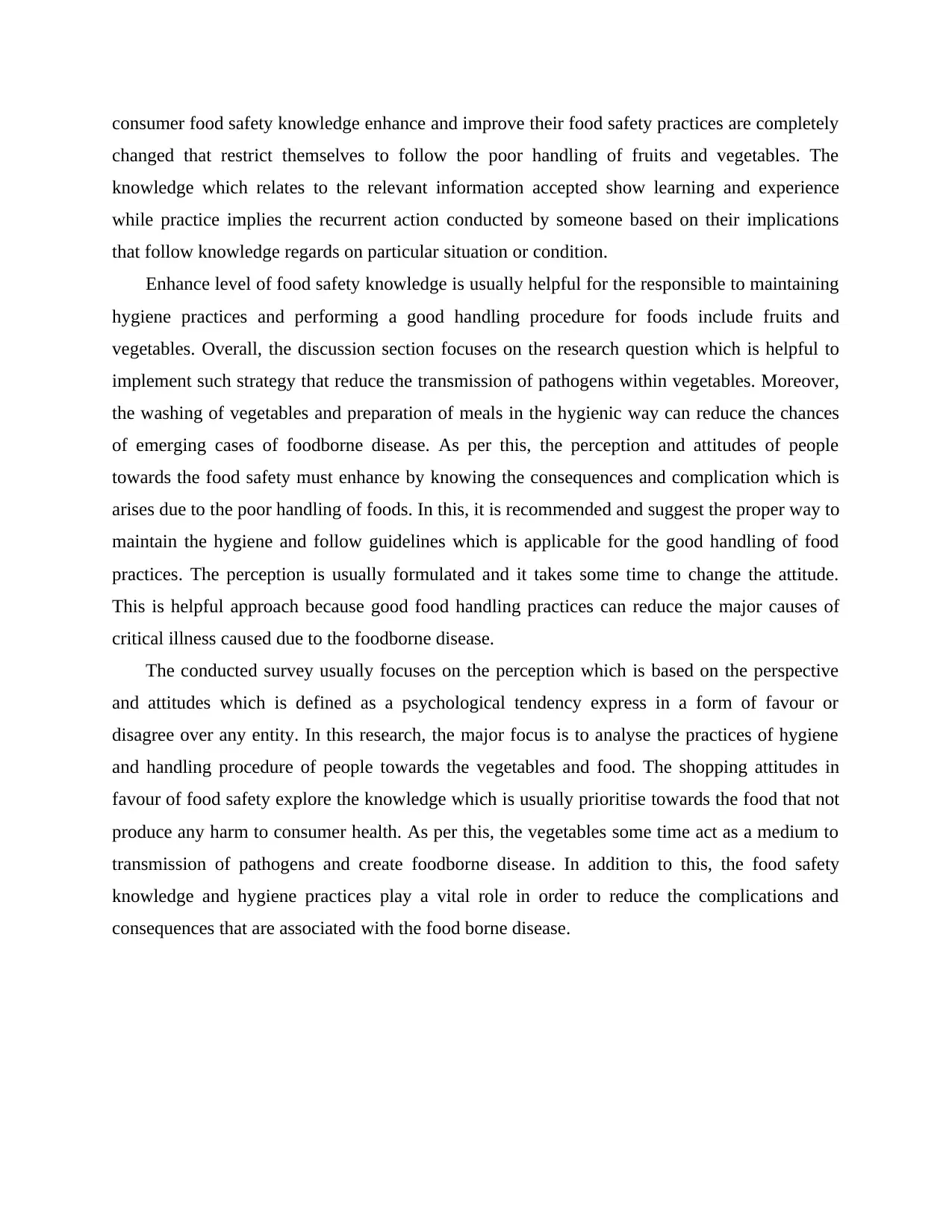
consumer food safety knowledge enhance and improve their food safety practices are completely
changed that restrict themselves to follow the poor handling of fruits and vegetables. The
knowledge which relates to the relevant information accepted show learning and experience
while practice implies the recurrent action conducted by someone based on their implications
that follow knowledge regards on particular situation or condition.
Enhance level of food safety knowledge is usually helpful for the responsible to maintaining
hygiene practices and performing a good handling procedure for foods include fruits and
vegetables. Overall, the discussion section focuses on the research question which is helpful to
implement such strategy that reduce the transmission of pathogens within vegetables. Moreover,
the washing of vegetables and preparation of meals in the hygienic way can reduce the chances
of emerging cases of foodborne disease. As per this, the perception and attitudes of people
towards the food safety must enhance by knowing the consequences and complication which is
arises due to the poor handling of foods. In this, it is recommended and suggest the proper way to
maintain the hygiene and follow guidelines which is applicable for the good handling of food
practices. The perception is usually formulated and it takes some time to change the attitude.
This is helpful approach because good food handling practices can reduce the major causes of
critical illness caused due to the foodborne disease.
The conducted survey usually focuses on the perception which is based on the perspective
and attitudes which is defined as a psychological tendency express in a form of favour or
disagree over any entity. In this research, the major focus is to analyse the practices of hygiene
and handling procedure of people towards the vegetables and food. The shopping attitudes in
favour of food safety explore the knowledge which is usually prioritise towards the food that not
produce any harm to consumer health. As per this, the vegetables some time act as a medium to
transmission of pathogens and create foodborne disease. In addition to this, the food safety
knowledge and hygiene practices play a vital role in order to reduce the complications and
consequences that are associated with the food borne disease.
changed that restrict themselves to follow the poor handling of fruits and vegetables. The
knowledge which relates to the relevant information accepted show learning and experience
while practice implies the recurrent action conducted by someone based on their implications
that follow knowledge regards on particular situation or condition.
Enhance level of food safety knowledge is usually helpful for the responsible to maintaining
hygiene practices and performing a good handling procedure for foods include fruits and
vegetables. Overall, the discussion section focuses on the research question which is helpful to
implement such strategy that reduce the transmission of pathogens within vegetables. Moreover,
the washing of vegetables and preparation of meals in the hygienic way can reduce the chances
of emerging cases of foodborne disease. As per this, the perception and attitudes of people
towards the food safety must enhance by knowing the consequences and complication which is
arises due to the poor handling of foods. In this, it is recommended and suggest the proper way to
maintain the hygiene and follow guidelines which is applicable for the good handling of food
practices. The perception is usually formulated and it takes some time to change the attitude.
This is helpful approach because good food handling practices can reduce the major causes of
critical illness caused due to the foodborne disease.
The conducted survey usually focuses on the perception which is based on the perspective
and attitudes which is defined as a psychological tendency express in a form of favour or
disagree over any entity. In this research, the major focus is to analyse the practices of hygiene
and handling procedure of people towards the vegetables and food. The shopping attitudes in
favour of food safety explore the knowledge which is usually prioritise towards the food that not
produce any harm to consumer health. As per this, the vegetables some time act as a medium to
transmission of pathogens and create foodborne disease. In addition to this, the food safety
knowledge and hygiene practices play a vital role in order to reduce the complications and
consequences that are associated with the food borne disease.
⊘ This is a preview!⊘
Do you want full access?
Subscribe today to unlock all pages.

Trusted by 1+ million students worldwide
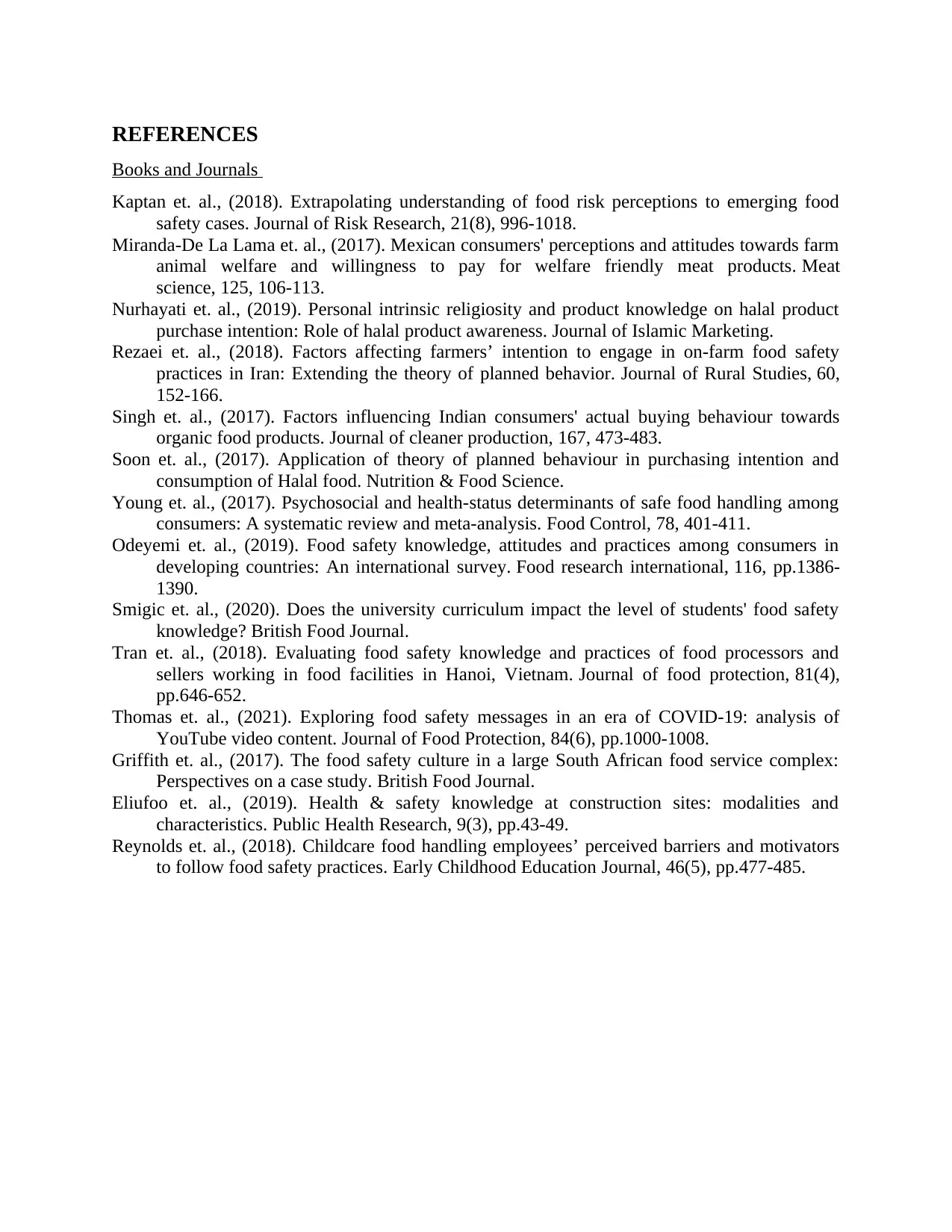
REFERENCES
Books and Journals
Kaptan et. al., (2018). Extrapolating understanding of food risk perceptions to emerging food
safety cases. Journal of Risk Research, 21(8), 996-1018.
Miranda-De La Lama et. al., (2017). Mexican consumers' perceptions and attitudes towards farm
animal welfare and willingness to pay for welfare friendly meat products. Meat
science, 125, 106-113.
Nurhayati et. al., (2019). Personal intrinsic religiosity and product knowledge on halal product
purchase intention: Role of halal product awareness. Journal of Islamic Marketing.
Rezaei et. al., (2018). Factors affecting farmers’ intention to engage in on-farm food safety
practices in Iran: Extending the theory of planned behavior. Journal of Rural Studies, 60,
152-166.
Singh et. al., (2017). Factors influencing Indian consumers' actual buying behaviour towards
organic food products. Journal of cleaner production, 167, 473-483.
Soon et. al., (2017). Application of theory of planned behaviour in purchasing intention and
consumption of Halal food. Nutrition & Food Science.
Young et. al., (2017). Psychosocial and health-status determinants of safe food handling among
consumers: A systematic review and meta-analysis. Food Control, 78, 401-411.
Odeyemi et. al., (2019). Food safety knowledge, attitudes and practices among consumers in
developing countries: An international survey. Food research international, 116, pp.1386-
1390.
Smigic et. al., (2020). Does the university curriculum impact the level of students' food safety
knowledge? British Food Journal.
Tran et. al., (2018). Evaluating food safety knowledge and practices of food processors and
sellers working in food facilities in Hanoi, Vietnam. Journal of food protection, 81(4),
pp.646-652.
Thomas et. al., (2021). Exploring food safety messages in an era of COVID-19: analysis of
YouTube video content. Journal of Food Protection, 84(6), pp.1000-1008.
Griffith et. al., (2017). The food safety culture in a large South African food service complex:
Perspectives on a case study. British Food Journal.
Eliufoo et. al., (2019). Health & safety knowledge at construction sites: modalities and
characteristics. Public Health Research, 9(3), pp.43-49.
Reynolds et. al., (2018). Childcare food handling employees’ perceived barriers and motivators
to follow food safety practices. Early Childhood Education Journal, 46(5), pp.477-485.
Books and Journals
Kaptan et. al., (2018). Extrapolating understanding of food risk perceptions to emerging food
safety cases. Journal of Risk Research, 21(8), 996-1018.
Miranda-De La Lama et. al., (2017). Mexican consumers' perceptions and attitudes towards farm
animal welfare and willingness to pay for welfare friendly meat products. Meat
science, 125, 106-113.
Nurhayati et. al., (2019). Personal intrinsic religiosity and product knowledge on halal product
purchase intention: Role of halal product awareness. Journal of Islamic Marketing.
Rezaei et. al., (2018). Factors affecting farmers’ intention to engage in on-farm food safety
practices in Iran: Extending the theory of planned behavior. Journal of Rural Studies, 60,
152-166.
Singh et. al., (2017). Factors influencing Indian consumers' actual buying behaviour towards
organic food products. Journal of cleaner production, 167, 473-483.
Soon et. al., (2017). Application of theory of planned behaviour in purchasing intention and
consumption of Halal food. Nutrition & Food Science.
Young et. al., (2017). Psychosocial and health-status determinants of safe food handling among
consumers: A systematic review and meta-analysis. Food Control, 78, 401-411.
Odeyemi et. al., (2019). Food safety knowledge, attitudes and practices among consumers in
developing countries: An international survey. Food research international, 116, pp.1386-
1390.
Smigic et. al., (2020). Does the university curriculum impact the level of students' food safety
knowledge? British Food Journal.
Tran et. al., (2018). Evaluating food safety knowledge and practices of food processors and
sellers working in food facilities in Hanoi, Vietnam. Journal of food protection, 81(4),
pp.646-652.
Thomas et. al., (2021). Exploring food safety messages in an era of COVID-19: analysis of
YouTube video content. Journal of Food Protection, 84(6), pp.1000-1008.
Griffith et. al., (2017). The food safety culture in a large South African food service complex:
Perspectives on a case study. British Food Journal.
Eliufoo et. al., (2019). Health & safety knowledge at construction sites: modalities and
characteristics. Public Health Research, 9(3), pp.43-49.
Reynolds et. al., (2018). Childcare food handling employees’ perceived barriers and motivators
to follow food safety practices. Early Childhood Education Journal, 46(5), pp.477-485.
1 out of 10
Related Documents
Your All-in-One AI-Powered Toolkit for Academic Success.
+13062052269
info@desklib.com
Available 24*7 on WhatsApp / Email
![[object Object]](/_next/static/media/star-bottom.7253800d.svg)
Unlock your academic potential
Copyright © 2020–2025 A2Z Services. All Rights Reserved. Developed and managed by ZUCOL.





